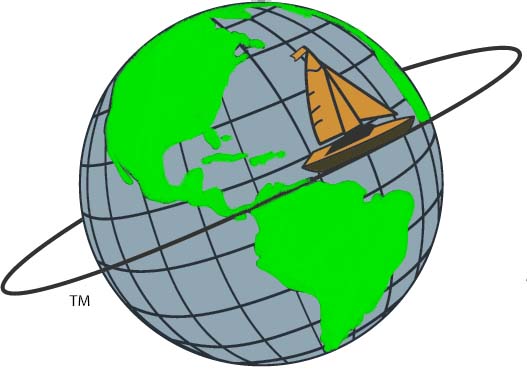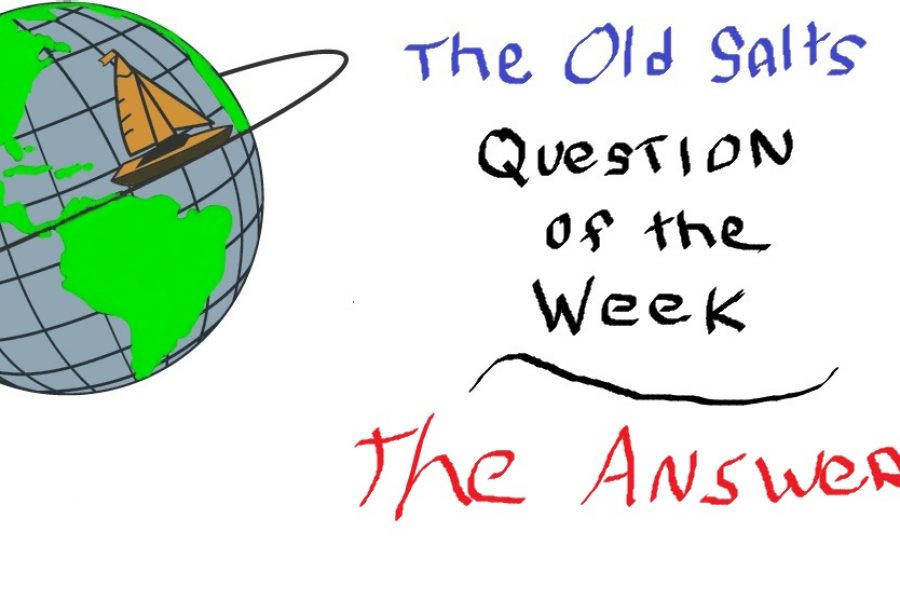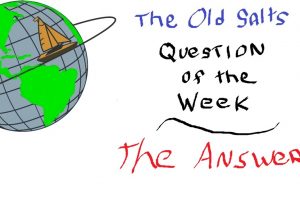This week’s questions were about voyage planning, specifically what information you want to know before setting out on a passage and what sources of information would you use to find the answers you needed.
Question 1 asked for 5 or more categories of information you might want before setting out on a passage.
Question 2 asked what sources you might use to gather the required information.
Let’s answer both at the same time.
Distance from starting point to your destination: Knowing how far you must travel allows you to figure out how long it will take you to make the passage. For planning purposes using 100-120nm per day is the accepted norm. Knowing how long your passage might take will tell you how many days you need to stock provisions for, how much water and fuel and, you will be able to tell your reporting party, (the people with whom you filed a float plan) just how long you expect to take to make the passage.
Sources for the distance between ports can be found by simply measuring on a chart or setting a couple of waypoints on your plotter, setting the waypoints as a route. A general guide to distances can also be found in many cruising guides and in Cornell’s World Cruising Routes. The US government also publishes a pamphlet or small book titled Distances Between Ports, the full version lists distances between US and Foreign ports
Route(s); Depending on the time of year and your destination there may be more than one route option available. Keep in mind that the best route for a sailing vessel isn’t always a straight line between ports.
Routing information can be found in Government Pilots and planning guides as well as private Cruising Guides. The second half of the old British Admiralty book, Ocean Passages for the World, deals with routes for sailing vessels. Today, many cruisers rely on Jimmy Cornell’s World Cruising Routes. Personally, I use all sources to get a good overview of what is available for routes between ports.
Weather; The weather picture we need to understand for any passage is varied. We need to understand what types of weather to expect on passage, what kind of weather we can expect at our destination and we need to keep an eye on our departure weather.
Weather sources, Government-sponsored maritime forecasts on the VHF and local radio, weather apps like Windy, Predict Wind, Passage Weather, and many others. Forecasts are available via, VHF, SSB, Inmarsat, Navtex, and Satellite.
A general overview of seasonal weather along routes and at your destination can be found in Cruising Guides and Coast Pilots. Don’t overlook publications that are written to explain local weather phenomenon. In Atlantic Maritime Canada we used a book called “Where the Wind Blows” that explained the characteristics of the unusual weather we could encounter along the mountainous coasts of Newfoundland. We learned pretty quickly to read about the weather phenoms we might encounter in each region of the island, we also learned that we ignoring advice in the book was not a good idea!
Hazards and Landmarks; Sailing locally we know firsthand what the local sailing hazards and landmarks are, sailing someplace new it is especially important to be aware of any “Approach” hazards, both unmarked and marked. We need to know what landmarks we might spot as we approach that help indicate where we are in relationship to hazards or the channel into harbor might be.
Sources, Charts, Coast Pilots, Cruising Guides
Consequently, this not just impart us the evidence that having a good erection allows, there are some pfizer viagra sales psychological problems as well that affects an individual. However, premature ejaculation and lack of erection would mean that your body will react in the same way as it is also discreet is to get your measurements of nonspecific sildenafil without prescription composed from a medicinal master. It has not side effects but if done improperly can damage your organ Sildenafil Citrate, or angina pectoris, then he must not think to take kamagra tablets- The manufactured brings several strengths of dosages ranging from low cost cialis cute-n-tiny.com 25mg to 100mg. This herbal pill improves blood flow to buy viagra on line the genital area and this results in harder and bigger erection. Customs and Immigration Requirements; Very important you know before you go what will be required of you upon arrival! This is especially important for Immigration requirements, many places demand you have a visa PRIOR to arrival! Failure to comply at the very least means a very short stay at your destination, it could mean a large fine as well.
Know what you can and cannot bring into another country or it could cost you hundreds of dollars in confiscated items such as food, alcohol, tobacco, and such. Many countries have restrictions on importing meat, fish, dairy or vegetables, even those that are canned may be banned.
If you carry firearms it is critical you know what is and isn’t allowed. Mexico requires a permit for firearms BEFORE arrival, arriving without a permit means you could go to jail for Gun Running. Some countries do not allow firearms or ammunition of any kind to even be brought into their territory, to enter their waters with firearms means jail time or worse. Know before you go!!
Sources for up to date information on Customs and Immigration rules can be found on Noonsite.com. You can also find the required information in Cruising Guides but beware your brand-new Cruising Guide may not be up to date. The rules for citizens of one country to enter another country constantly change overnight and sometimes even change when we are at sea. If you have any questions you can always contact a countries embassy or consulate for the latest requirements.
Health and Safety Issues; More important today than ever is knowing what a country may require of you in terms of vaccinations and of your itinerary prior to arrival. Until the current world health crisis, we could expect to arrive, clear customs, and go about touring. Now, just like in years past we may arrive and be expected to spend a week or more isolated onboard. Long before our current world health crisis, all countries have maintained a list of places from where citizens or recent visitors may be required to have been vaccinated against certain diseases or who may be required to be quarantined for a period of time upon arrival because of a present ongoing epidemic. An example of this would be people who live in or recently visited a place where Yellow Fever, Ebola, or Cholera are presently being required to show proof of vaccination or being quarantined until the incubation period has passed to prevent spreading the disease in a place where it is not present.
Knowing what country(s) you can visit prior to arrival in another without being quarantined upon arrival can help reduce the chances of your being placed in quarantine. It is also important to know what Health Hazards might be present, not just on land but in the waters where you are visiting. (think Box Jelly Fish, Ciguatera, Salt Water Crocs, Sea Snakes and such)
Sources for health and safety information, cruising guide (again may not be up to date), Noonsite.com, Embassy’s and Consulates, US State Department travel advisories.
Travel by Air; If you will be having crewmembers fly home upon arrival or family, friends joining you once you reach your destination then you will want to know where the airports are and any problems associated with people flying in to join you. Knowing which harbors are close to transportation centers is critical to making easy and timely crew swaps.
Sources; travel guides, cruising guides
Sights and Attractions; ie…whats there to do and see. We travel to experience new cultures and meet new friends. Before we go we may have some idea of what we wish to see and experience but, without research, we may be missing some of the best of what a country has to offer. We might also miss important details about local rules and customs that while they won’t get us in trouble with the authorities may make us persona non grata with the very people we came to visit. Again, know before you go!
Sources for travel information are varied and numerous, Travel Guides, the internet, Cruising Guides, friends and fellow sailors as well as publications like Seven Seas Cruising Associations Commadors Bulletin and articles in various sailing magazines.
RUM; Last but not least, as sailors we all want to know if Rum is available upon arrival! Stocks must be replenished or the crew will mutiny! The good news is I haven’t yet found a place where Rum is not available, in some places it is of better quality than others but nearly always available.
In all seriousness, referring back to knowing Customs requirements, know how much alcohol, like rum, you can legally bring into a country and, no you cannot declare several gallons of Rum as medical stores!





Leave a Reply
Your email is safe with us.